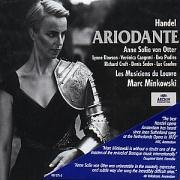| All Artists: George Frideric Handel, Marc Minkowski, Les Musiciens du Louvre, Anne Sofie von Otter, Ewa Podles, Lynne Dawson, Veronica Cangemi, Richard Croft, Denis Sedov, Luc Coadou Title: Handel - Ariodante / von Otter, Dawson, Cangemi, Podles, Croft, Sedov, Coadou, Les Musiciens du Louvre, Minkowski Members Wishing: 2 Total Copies: 0 Label: Archiv Produktion Release Date: 8/10/1999 Genre: Classical Styles: Opera & Classical Vocal, Historical Periods, Baroque (c.1600-1750) Number of Discs: 3 SwapaCD Credits: 3 UPC: 028945727127 |
Search - George Frideric Handel, Marc Minkowski, Les Musiciens du Louvre :: Handel - Ariodante / von Otter, Dawson, Cangemi, Podles, Croft, Sedov, Coadou, Les Musiciens du Louvre, Minkowski
 | George Frideric Handel, Marc Minkowski, Les Musiciens du Louvre Handel - Ariodante / von Otter, Dawson, Cangemi, Podles, Croft, Sedov, Coadou, Les Musiciens du Louvre, Minkowski Genre: Classical
Ariodante is one of Handel's most consistently fine operas. Yes, yes, there are whole strings of da capo arias, but they are so dramatically apt and melodically interesting that things never get tiresome. Harmonia Mundi re... more » |
Larger Image |
CD DetailsSynopsis
Amazon.com essential recording Ariodante is one of Handel's most consistently fine operas. Yes, yes, there are whole strings of da capo arias, but they are so dramatically apt and melodically interesting that things never get tiresome. Harmonia Mundi recently released a fine recording of this opera (conducted by Nicholas McGegan and starring "La Divina" Lorraine Hunt), yet this is even better. Anne Sofie Von Otter has, in recent years, sometimes oversung in Baroque music, but her tone here is ideal--heroic and powerful yet pure. Lynne Dawson is simply spectacular throughout, her coloratura, tone, and emotional range being everything one could wish for. Contralto Ewa Podles makes a genuinely menacing arch-villain in a role taken too often by flimsy falsettists. There's not a weak link in the cast, and Mark Minkowski's conducting is consistently exciting. There is no better recording of a Handel opera out there. --Matthew Westphal Similarly Requested CDs
|
CD ReviewsInspired Performance Goodwin Deacon | Seattle, WA USA | 10/17/2000 (5 out of 5 stars) ""Ariodante" is one of Handel's finest scores (with the possible exception of "Giulio Cesare"). Of the four recordings available, this is unquestionably the best. The singing is phenominal, with von Otter rivaling the legendary Dame Janet Baker for masculinity of timbre and vividness of interpretation. Listen to her daringly slow "Scherza infida" and you will finally understand the power of Handel's dramatic genius. Minkowski is nothing less than inspired throughout. Yes, he pushes his singers and orchestra to their limits, but always to telling effect. Listening to this recording in one sitting I was in awe of Minkowski's mastery of musical and overall dramatic structure. Next to this McGegan's celebrated set sounds dull and bland. (It now sits on my shelf collecting dust!) I have studied "Ariodante" for years and have been involved in two staged productions, so I know this score intimately. Minkowski's rendition is one of the great recordings of this Handel opera, or any other I have heard. This "Ariodante" is a classic!" ...spoilt for choice! Ed Beveridge | London, England | 04/23/2002 (5 out of 5 stars) "This review is a bit of an addendum to the one I wrote about the McGegan Ariodante. How lucky we are to have both his and Minkowski's superb recordings, so different yet both alive with vocal and dramatic excitement.I've mentioned that I choose McGegan over Minkowski and it is for a number of reasons. That said, I feel that both are really excellent and either is a good choice. My main reservation about this set concerns the conducting. The tempos are all so extreme - on the one hand, Scherza Infida is so slow as to almost cripple poor von Otter (she's a good enough artist to get through - but it's a real challenge for the listener). Then on the other hand, much of the dance music and many of the arias (poor Veronica Cangemi in Dalinda's Act 1 number!) is taken at very, very high speed. The sound made by the Musiciens du Louvre is vibrant and alive but lacks the refinement and beauty of McGegan's orchestra. Minkowski is liberal - sometimes to a fault - with ornaments, and I feel that occasionally less would be so much more.Fewer reservations about the singing. Von Otter is a wonderful hero, full and radiant of voice, rock-solid and exciting of technique. If she made just a little more of the words she would be the Ariodante of our time. Dawson's Ginevra has been highly praised here and elsewhere and whilst she sings most beautifully and with bags of feeling, I (heretic that I am!) find her range of vocal colour just a bit limited. Cangemi's voice is accurate but thin, whilst thin is never a term that could be applied to Podles' mighty contralto. She's not a subtle singing actress, but the sheer power and security of her singing is what impresses. Croft is certainly an improvement on his Harmonia Mundi counterpart.A very, very good recording that for me isn't quite the equal of its main rival, but certainly wouldn't disappoint any Handel lover. Five stars, and no mistake." Love on the rocks in Scotland Anastasia Beaverhausen | London, UK | 01/08/2001 (5 out of 5 stars) ""Ariodante" (1735) was intended for some of the leading performers of Handel's time. Stiff competition from Nicola Porpora and the threat of bankruptcy `forced' Handel to write works of higher quality for the first time since the Big Three: "Giulio Cesare" (1724), "Tamerlano" (1724) and "Rodelinda" (1725). Two things make "Ariodante" and its sister opera "Alcina" (1735) exceptional: 1. singers of the four major voice categories (i.e. soprano, alto, tenor and bass). Often Handel operas do without low male voices, e.g. "Teseo" (1713) and "Amadigi" (1715). 2. the services of the notorious French ballerina Mlle. Salle and her ballet troupe. The instrumentation of "Ariodante" is not as grand as in "Giulio Cesare", "Rinaldo" (1711) or "Teseo" which are designed to make a splash and to ravish the senses. In "Ariodante" the orchestra is `down-scaled' to strings, oboes, horns and continuo - a trumpet also appears when Ginevra is vindicated. Handel utilises the orchestra in such a way that the sound world varies from one aria to the next to capture the right mood to reflect and propel the drama. Minkowski is onto something great with his version - and what an inspired reading it is! He keeps the drama moving at a fast pace (maybe too fast sometimes, like Dalinda's final aria). It's hard to believe it, but the singers and wonderful orchestra keep up with him in this live recording. Minkowski has Anna Sofie von Otter as Ariodante, the role created for the talented castrato Cusanino. Handel wrote exceptionally demanding and expansive coloratura arias for Cusanino (see Teseo's arias in "Arianna in Creta"). Von Otter sings with a clinical precision that can be hard to listen to at times and her already androgynous voice does not lend much appeal to her interpretation; like Fischer-Dieskau she tries to colour every note and syllable to make it more meaningful - too much spice is just as undesirable as too little - but she sings the zipping coloratura of the first version of "Con l'ali" with unequalled skill! For me "Scherza infida" suffers the most from her overbearing colouration of the vocal line, and "Dopo notte" does not touch Janet Baker's first exulted recording. Nonetheless, I think few mezzos today can equal von Otter in this repertoire. The Ginevra, Lynne Dawson, delivers an uneven performance. In moments Dawson's singing can be exquisite and in others painful. She does have a very beautiful voice, but at times she sounds strained. The demands placed on Anna Strada del Po, who first created this role, seem unreasonable at first - until you listen to Edith Mathis do justice to this role on the Leppard set. Veronica Cangemi sings Dalinda. Her runs are delivered at a cracking pace - and one wishes sometimes that Minkowski had given her more breathing space, literally and figuratively. Even in the more reflective moments her character comes off like Blondchen on 78 speed. But she delivers the goods at all times.Ewa Podles sings ("sings" being the understatement of the century) Polinesso. Nothing can quite describe how Podles transforms Polinesso's less spectacular music into something special. She delivers the most outstanding performance on this recording, turning every aria into a Gala Event! No words can convey the talents of Podles: coloratura, high notes, low notes, long phrases - none holds any terror for this incredible ARTIST. Perfect diction, perfect colouration of the vocal line without resorting to ham effects make it a complete mystery why this underrated singer is not more widely recorded. Richard Croft as Lurcanio has the least interesting character next to Odoardo in this opera, but he brings Lurcanio to life in his arias. Croft's "Il tuo sangue" is probably one of the most exciting recorded Handel arias ever. Denis Sedov as the The King has a beautiful, full and flexible bass voice. He has a few stunning arias, and he delivers a very fine performance."Ariodante" can really be seen as Handel's "Cosi". In both operas the focus is on the emotional turmoil of the characters and not the social implications of their actions. Two moments stand out here: the sinfonia introducing Act 2 and the first Ariodante/Ginevra duet. The King interrupts them before they can continue with the da capo! "Ariodante" is not just pretty music. Handel was always ahead of his contemporaries: in "Io ti bacio" Ginevra leaves her father to await execution. The introduction consists of four notes in the continuo. Then the violins alone accompany the vocal line in unison until all the instruments join in harmony on a Neapolitan chord - the 18th century chord to convey great despair. Most revolutionary is the second Act ending with an accompanied recitative to reflect Ginevra's madness - in the Baroque era this is unheard of. Then there is the intimate Lurcanio/Dalinda duet which starts of as an aria for Lurcanio, but when you expect the B section to start Dalinda joins, and what magic, what bliss, when their voices unexpectedly unite in harmony at the end with the tenor singing a 3rd above the soprano - very Puccini! Mozart is said to have remarked: "Handel understands effect better than any of us - when he chooses, he strikes like a thunderbolt..."I cannot resist mentioning the consecutive arias: Ginevra's "Volate amore"; The King's "Voli colla sua tromba" and Ariodante's "Con l'ali di costanza" which caused Burney to complain of Act 1 having nothing but "wings and flying"!In closing: "Ariodante" appeals to our human and romantic nature, and unlike "Lotario" does not deal with the fate of nations, but rather the emotions of the individual. All these factors, and I wager the reduced orchestra, make us focus on the dark, distressing and mysterious atmosphere which pervades over this opera and its characters, an atmosphere perhaps only equalled in Wagner's "Lohengrin". I look forward to Minkowski's reading of "Arianna in Creta"."
|

 Track Listings (33) - Disc #1
Track Listings (33) - Disc #1